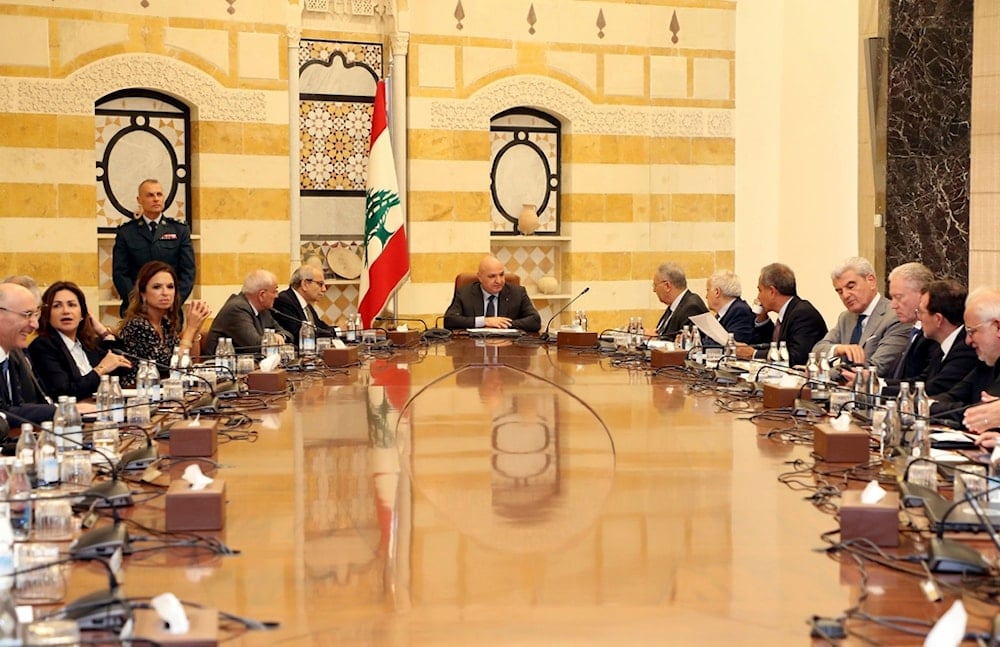Hezbollah, Amal ministers walk out of cabinet over US disarmament plot
Hezbollah and Amal ministers, as well as Fadi Makki, withdraw from the Lebanese cabinet, rejecting PM Salam’s push to discuss US envoy Tom Barrack's disarmament proposal.
-

Lebanese president Joseph Aoun, centre, leads a Cabinet meeting which is supposed to discuss the disarmament of Hezbollah, at the presidential palace in Baabda, east of Beirut, Lebanon, Thursday, August 7, 2025 (Lebanese Presidency press office)
Ministers representing the national Shia alliance, Hezbollah and the Amal Movement, alongside Minister of State for Administrative Development Fadi Makki, withdrew from the Lebanese cabinet session on Thursday afternoon, according to Al Mayadeen’s correspondent in Beirut.
The walkout came during a government session convened to discuss a proposal reportedly advanced by US envoy Tom Barrack. The ministers objected to Prime Minister Nawaf Salam’s insistence on proceeding with the discussion, demanding instead that the cabinet revisit its list of national priorities and amend a previous decision.
According to Al Mayadeen, the ministers explicitly refused to engage with the American proposal and insisted on a broader reassessment of the cabinet’s course of action.
The reporter noted that the withdrawal of ministers representing Lebanon’s Shia component now throws the cabinet’s constitutional legitimacy into question. The Lebanese constitution, particularly in its preamble, emphasizes that cabinet sessions must maintain national representation. The absence of any sectarian component strips the government of its "mīthāqiyya", or consensual legitimacy, rendering any decision taken in such a session effectively void in the eyes of many political factions.
This latest rupture follows another cabinet session just two days earlier, in which the government voted to task the Lebanese Army with formulating an actionable plan to place all weapons under state control by the end of the year. That session also saw a partial walkout by the same ministers, with Fadi Makki being the only Shiite-aligned minister to remain until the end.
'US proposal aids Israeli agenda'
The Loyalty to the Resistance Bloc warned Thursday that Lebanon and the wider region are undergoing one of the most dangerous phases in recent history, facing existential threats to their sovereignty, geography, and economy. In a statement following its regular meeting, the bloc denounced the escalating Israeli aggression, backed by the United States and certain Western and Arab powers, as part of a broader campaign aimed at redrawing regional balances at Lebanon's expense.
At the heart of the bloc's condemnation is the Lebanese government's recent endorsement of a proposal put forward by US envoy Tom Barrack. The bloc described the move as "a clear reversal" of the government's ministerial commitments and a breach of the presidential oath. It stressed that the paper contradicts the foundational principles of the Taif Accord, which guarantees Lebanon's right to self-defense and the preservation of national sovereignty.
The bloc described the government's endorsement of the US paper as "suspiciously hasty and unjustifiable," warning that such a position constitutes a "clear violation of the National Pact" and threatens to strip Lebanon of one of its greatest sources of strength: the resistance.
Resistance Under Target
The bloc warned that attempts to undermine or target the arms of the resistance constitute "a free gift to the Israeli enemy," particularly at a time when Israeli forces continue to violate Lebanese sovereignty and carry out near-daily assassinations of civilians and resistance fighters alike. The bloc affirmed that Hezbollah's military capability remains a central pillar of national defense, especially in the face of increasing threats and the absence of any credible international guarantees.
According to the statement, a broad national front, including parties from across sectarian lines, independent figures, and civil society, has expressed firm rejection of the US proposal, which many see as part of a wider project to neutralize Lebanon's ability to resist foreign aggression.
The bloc stressed the dangerous timing of the push to disarm the resistance, coinciding with an escalation in Israeli military operations and the complete absence of alternative mechanisms capable of defending the Lebanese people. The group added that so-called guarantees offered by Arab or international actors have consistently failed to materialize, leaving Lebanon vulnerable to external pressure.

 4 Min Read
4 Min Read








